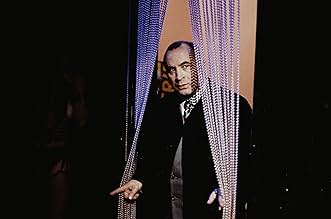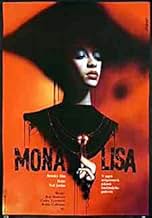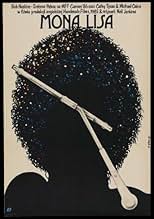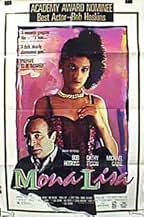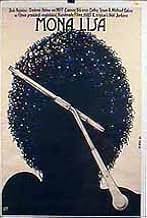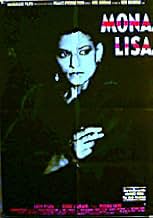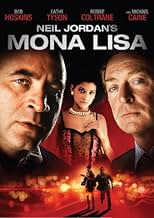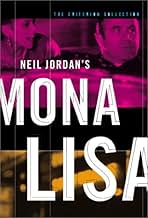VALUTAZIONE IMDb
7,3/10
19.765
LA TUA VALUTAZIONE
Un uomo appena uscito di prigione riesce a trovare un lavoro guidando una accompagnatrice, da cliente a cliente.Un uomo appena uscito di prigione riesce a trovare un lavoro guidando una accompagnatrice, da cliente a cliente.Un uomo appena uscito di prigione riesce a trovare un lavoro guidando una accompagnatrice, da cliente a cliente.
- Candidato a 1 Oscar
- 14 vittorie e 14 candidature totali
Joseph Karimbeik
- Raschid
- (as Hossein Karimbeik)
John R. Darling
- Hotel Security
- (as John Darling)
Raad Rawi
- Arab Servant
- (as Raad Raawi)
Recensioni in evidenza
After seeing Hoskins in "The Long Good Friday", I was eager to catch another one of his highly celebrated performances. Filling in a similar role as an ex-con looking for work in 1980s London, I found his relationship with a call-girl to be highly effective in the character's exploration of a world he is simultaneously out of touch, but all too familiar with. It is a story that moves along leisurely, as he is soon employed by his employer's worker to find a vulnerable young girl on the streets, and it is here that the film offers a disparaging outlook on urban prostitution, through the annals of both high and low society. Hoskin's character becomes embroiled in an emotional investment beyond his control, and like any Noir protagonist, is very soon out of his league and receiving the short end of the stick.
The ending revelation is effective, but slightly underwhelming when one realizes that his journey was doomed from the beginning, but this kind of set up is to be expected from these sorts of tales. The character development and progression between lead actor and actress is simple, but highly effective.
The cinematography comes across as drab sometimes, but there are many beautiful moments in this film with some detailed choreography and impressive lighting of seedy, smoke filled interiors as Hoskins navigates the Londonian labyrinths.
The ending does feel slightly rushed, but there are so many great moments, and the film has a lot of untold backstory that gives its characters a lot of depth and very realistic insight into human longing. This is a great example of effective exposition that is relayed naturally and not a distraction or disservice to the film. A few choppy moments, but overall 'Mona Lisa' is more than the sum of its parts, and is an entertaining and atmospheric indie flick from Neil Jordan.
The ending revelation is effective, but slightly underwhelming when one realizes that his journey was doomed from the beginning, but this kind of set up is to be expected from these sorts of tales. The character development and progression between lead actor and actress is simple, but highly effective.
The cinematography comes across as drab sometimes, but there are many beautiful moments in this film with some detailed choreography and impressive lighting of seedy, smoke filled interiors as Hoskins navigates the Londonian labyrinths.
The ending does feel slightly rushed, but there are so many great moments, and the film has a lot of untold backstory that gives its characters a lot of depth and very realistic insight into human longing. This is a great example of effective exposition that is relayed naturally and not a distraction or disservice to the film. A few choppy moments, but overall 'Mona Lisa' is more than the sum of its parts, and is an entertaining and atmospheric indie flick from Neil Jordan.
After serving seven years in prison, the smalltime criminal George (Bob Hoskins) is released. He seeks out his daughter but his ex-wife does not allow him to talk to her. His friend Thomas (Robbie Coltrane) meets George and gives his Jaguar that he kept for him. George is impressed with the changing in the neighborhood while Thomas explains the new reality. George is hired by his former boss Mortwell (Michael Caine) to work as the driver and bodyguard of the high-class call girl Simone (Cathy Tyson). In the beginning, George is misfit for the position and does not get along with Simone; but gradually he befriends and falls in unrequited love with her. Simone looks for someone on the streets of the King's Cross district (red light district of London in the 80's) and soon she asks George to help her to find the prostitute Cathy (Kate Hardie). George is involved with the underworld of prostitution and is chased by the dangerous pimp Anderson (Clarke Peters). When he finds Cathy, he discovers the connection of Simone to her.
"Mona Lisa" is a melancholic love story in an environment of low-lives and losers in the underworld of London. The beginning of this movie is a drama entwined with romance and ends a thriller. The good-hearted George is a needy small-time criminal, naive in many moments that falls in love with the prostitute Simone. Bob Hoskins, Cathy Tyson and Michael Caine have magnificent performances. Nat King Cole´s song gives a touch of class to his great film. My vote is eight.
Title (Brazil): "Mona Lisa"
Note: On 17 July 2018 I saw this film again.
"Mona Lisa" is a melancholic love story in an environment of low-lives and losers in the underworld of London. The beginning of this movie is a drama entwined with romance and ends a thriller. The good-hearted George is a needy small-time criminal, naive in many moments that falls in love with the prostitute Simone. Bob Hoskins, Cathy Tyson and Michael Caine have magnificent performances. Nat King Cole´s song gives a touch of class to his great film. My vote is eight.
Title (Brazil): "Mona Lisa"
Note: On 17 July 2018 I saw this film again.
"Mona Lisa" is a moving and memorable combination of the British crime film and the character study, produced by George Harrison's company Handmade Films, and serves as a showcase for some very impressive performances. Top billed Bob Hoskins, in particular, in his Best Actor Academy Award nominated performance, is the person we follow through a convincing depiction of the seamy underbelly of London, a land populated by pimps, prostitutes, and mobsters such as the nasty Mortwell, played by Michael Caine. Hoskins's George is a low level mob member getting out of prison after spending seven years there, emerging into a world unfamiliar to him. He's given the initially thankless task of acting as chauffeur for high class prostitute Simone, played by the lovely and amazing Cathy Tyson. But before very long, they start warming up to each other, and the balance of the movie charts their evolving relationship. Ultimately George decides to do Cathy a favour by finding a long lost acquaintance of hers, but this leads to less than ideal circumstances for all involved. Director Neil Jordan, who co-wrote the screenplay with David Leland, has created a compelling if deliberately paced drama that's much more character driven than action oriented, although there are some brief bursts of violence here and there. The film also has quite the sense of humour at times, much of it coming from the engaging Robbie Coltrane as George's good friend Thomas. Thomas likes to create art using plastic spaghetti (!), and there is a nice light touch brought to all scenes with Hoskins and Coltrane, which prevents this story from ever being too much of a downer, although for the most part "Mona Lisa" is grim and gritty stuff, with fairy tale and film noir elements emphasized. By the end, George realizes how much he's been manipulated by his femme fatale Simone. Jordan completely pulls us into this vivid environment, and gets nice supporting performances from Kate Hardie as Cathy, Zoe Nathenson as Jeannie, and Sammi Davis as May, as well as a sufficiently slimy portrayal by Clarke Peters ('The Wire') as vicious pimp Anderson. (Trivia note: look for Kenny Baker, always to be best known as R2-D2 in the "Star Wars" franchise, as a boardwalk busker.) Fine music by Michael Kamen is a plus, as well as soundtrack selections including Nat King Cole's performances of "When I Fall in Love" and the title tune. Worth seeing for fans of the crime film and of the cast & crew, "Mona Lisa" is potent entertainment. Eight out of 10.
Bob Hoskins' performance in Mona Lisa is usually highly praised and spoken in the same breath as his portrayal of hood boss Harold Shand in The Long Good Friday (1980). But apart from their shady dealings within the British criminal underworld, their characters couldn't be more different. Where Harold was an old-fashioned, respectable gangster who had excelled in his business now looking to go straight, Mona Lisa's George is a petty crook fresh out of a long stretch in prison. They are both fascinating, detailed portrayal's, but I feel George is the more complex performance, serving as a sad reminder of the fact that the world lost one of it's finest actors last year.
Thrust back into a world that seems to evolved without him, George manages to land a job driving call girls from client to client. His first customer is Simon (Cathy Tyson), a beautiful, upper-end call girl who clashes with George's bull-headed personality. She gives him money to buy some decent clothes, and he shows up in a Hawaiian shirt and leather jacket. With time, their differences become their bond, and Simone asks George to help her find her old friend, a young girl named Cathy (Kate Hardie), who is still in the hands of a sadistic pimp (played by The Wire's Clarke Peters). Meanwhile, George's old boss Denny Mortwell (Michael Caine) is suspicious of their activities and demands that George provide information on Simone.
The movie doesn't go over-the-top with its depiction of the capital's seedy underbelly, but is far more subtle in the way it plays on our expectations. We're all aware of the presence of prostitutes in practically every town in the country, but do we ever really consider what they spend their money on? How they are treated? Where do they sleep at night? We glimpse the true barbarism behind the red lights here, something that George finds difficult to deal with. However, the film is by no means grim, with an excellent script by director Neil Jordan and David Leland providing many amusing moments, particularly in the exchanges between George and his detective story-loving friend Thomas (Robbie Coltrane).
The performances are excellent all round. Hoskins is a rather lovable lunk, proving to be almost insistent at drawing unwanted attention to himself and Simone; at complete odds with this new world he stumbles across. He's the type of guy who asks for a cup of tea at a strip club. Tyson too (what happened to her?) projects real vulnerability under her mask of confidence and beauty. When the movie shifts from drama to thriller in the last third, Caine becomes a menacing presence with a unnerving lack of emotion. All the filth we witness is all just business to him. By the end, as what I initially thought was a character-driven relationship drama turned into something else entirely, the film had subverted my expectations so much that I had to just sit back and admire.
Thrust back into a world that seems to evolved without him, George manages to land a job driving call girls from client to client. His first customer is Simon (Cathy Tyson), a beautiful, upper-end call girl who clashes with George's bull-headed personality. She gives him money to buy some decent clothes, and he shows up in a Hawaiian shirt and leather jacket. With time, their differences become their bond, and Simone asks George to help her find her old friend, a young girl named Cathy (Kate Hardie), who is still in the hands of a sadistic pimp (played by The Wire's Clarke Peters). Meanwhile, George's old boss Denny Mortwell (Michael Caine) is suspicious of their activities and demands that George provide information on Simone.
The movie doesn't go over-the-top with its depiction of the capital's seedy underbelly, but is far more subtle in the way it plays on our expectations. We're all aware of the presence of prostitutes in practically every town in the country, but do we ever really consider what they spend their money on? How they are treated? Where do they sleep at night? We glimpse the true barbarism behind the red lights here, something that George finds difficult to deal with. However, the film is by no means grim, with an excellent script by director Neil Jordan and David Leland providing many amusing moments, particularly in the exchanges between George and his detective story-loving friend Thomas (Robbie Coltrane).
The performances are excellent all round. Hoskins is a rather lovable lunk, proving to be almost insistent at drawing unwanted attention to himself and Simone; at complete odds with this new world he stumbles across. He's the type of guy who asks for a cup of tea at a strip club. Tyson too (what happened to her?) projects real vulnerability under her mask of confidence and beauty. When the movie shifts from drama to thriller in the last third, Caine becomes a menacing presence with a unnerving lack of emotion. All the filth we witness is all just business to him. By the end, as what I initially thought was a character-driven relationship drama turned into something else entirely, the film had subverted my expectations so much that I had to just sit back and admire.
Bob Hoskins made two widely popular movies in the 1980s and this was one of them. Having seen the other, "The Long Good Friday," I wasn't expecting too much but was pleasantly surprised. Hoskins, just out of the slams, is hired to drive a high-end black hooker, Cathy Tyson, from one wealthy client to another. He grows to care for her and when she asks him for a favor, find a strung-out young girl named Kathy, a former roomie of hers, he agrees. He searches the seedier places of London until he finally digs her up. She very young and very hooked. Robbie Coltrane is Hoskins' friend, and Michael Caine is a sort of procurer. The ending is both distressing and violent -- distressing because some of these characters are fully fleshed and we feel we've come to know them.
The film is quite nicely done. The score makes much use of Nat "King" Cole's ballad, Mona Lisa, evoking mystery, and it's appropriate. The composer has worked what seem to be endless variations of the first four notes of the theme into the score. We hear it in the background often, in minor key, or played exclusively on double bass, or burnished by horns. Those four notes insinuate themselves into the incidental music so often that a listener loses the sense that they are the introduction to a pop song and they come to have an ominous functional autonomy, disembodied from the simple tune that prompted it. They become their own song.
The acting is fine. Bob Hoskins is an essentially moral guy, short and unprepossesing, who first shows up on screen wearing an echt-1970s bell-bottomed leisure suit (he's been in for seven years, remember) and carrying a bouqet of flowers that his wife, berserk with anger, tells him what to do with. His gradual attraction to his passenger is nicely laid out, as are the reasons for his occasional displays of violence. He's a sensitive guy, but not too thoughtful. A lot of things get by him. But, to be fair, they get by the viewer too.
There's an element of humor running through the film, mostly expressed in the relationship between Hoskins and Coltrane, who plays a writer and a sculptor of things made of plastic spaghetti. ("The Japanese have cornered the market.") The dialogue is pretty funny in a low-key way. Hoskins and Coltrane sit watching TV and Hoskins remarks something like, "Remember that guy who was murdered? Well, I did it." Coltrane: "You're not joking?" Hoskins (turning and staring grimly): "I -- never -- joke." Coltrane: "You used to tell that one about the randy gorilla." And here is Hoskins describing his passenger, telling Coltrane that she's not out to exploit him, Hoskins, because "she's a lady." Coltrane: "A lady? I thought you said she was a tart." Hoskins: "Well -- she is, but she's a f****** lady too."
And Cathy Tyson almost beggars description, tall, slender, lithe, not staggeringly beautiful or sexy, but her appeal extends far beyond mere appearance. She's gorgeous in the most personal way. She tends to keep her face down and her eyes lowered, almost demurely, and her voice is soft and low, just above a whisper, although you never have to strain to hear what she's saying because her pronunciation is modulated and precise. It's soothing, in control and at the same time reassuring, the voice of an announcer on a late-night FM station playing nothing but classical music. You could listen to her for hours. You could look at her for hours too, for that matter. Michael Caine doesn't have a big or showy part, but he's so reliable that he's always a pleasure to see on screen. I can't think of a single film that has been damaged by his presence, although he's been in a few bummers.
The photography is perceptive. We get a good deal of local color not only from the London locations but from "the seaside," where everything comes to a head. There isn't a lot of violence. What there is of it is quick and pointed.
See it if you get the chance.
The film is quite nicely done. The score makes much use of Nat "King" Cole's ballad, Mona Lisa, evoking mystery, and it's appropriate. The composer has worked what seem to be endless variations of the first four notes of the theme into the score. We hear it in the background often, in minor key, or played exclusively on double bass, or burnished by horns. Those four notes insinuate themselves into the incidental music so often that a listener loses the sense that they are the introduction to a pop song and they come to have an ominous functional autonomy, disembodied from the simple tune that prompted it. They become their own song.
The acting is fine. Bob Hoskins is an essentially moral guy, short and unprepossesing, who first shows up on screen wearing an echt-1970s bell-bottomed leisure suit (he's been in for seven years, remember) and carrying a bouqet of flowers that his wife, berserk with anger, tells him what to do with. His gradual attraction to his passenger is nicely laid out, as are the reasons for his occasional displays of violence. He's a sensitive guy, but not too thoughtful. A lot of things get by him. But, to be fair, they get by the viewer too.
There's an element of humor running through the film, mostly expressed in the relationship between Hoskins and Coltrane, who plays a writer and a sculptor of things made of plastic spaghetti. ("The Japanese have cornered the market.") The dialogue is pretty funny in a low-key way. Hoskins and Coltrane sit watching TV and Hoskins remarks something like, "Remember that guy who was murdered? Well, I did it." Coltrane: "You're not joking?" Hoskins (turning and staring grimly): "I -- never -- joke." Coltrane: "You used to tell that one about the randy gorilla." And here is Hoskins describing his passenger, telling Coltrane that she's not out to exploit him, Hoskins, because "she's a lady." Coltrane: "A lady? I thought you said she was a tart." Hoskins: "Well -- she is, but she's a f****** lady too."
And Cathy Tyson almost beggars description, tall, slender, lithe, not staggeringly beautiful or sexy, but her appeal extends far beyond mere appearance. She's gorgeous in the most personal way. She tends to keep her face down and her eyes lowered, almost demurely, and her voice is soft and low, just above a whisper, although you never have to strain to hear what she's saying because her pronunciation is modulated and precise. It's soothing, in control and at the same time reassuring, the voice of an announcer on a late-night FM station playing nothing but classical music. You could listen to her for hours. You could look at her for hours too, for that matter. Michael Caine doesn't have a big or showy part, but he's so reliable that he's always a pleasure to see on screen. I can't think of a single film that has been damaged by his presence, although he's been in a few bummers.
The photography is perceptive. We get a good deal of local color not only from the London locations but from "the seaside," where everything comes to a head. There isn't a lot of violence. What there is of it is quick and pointed.
See it if you get the chance.
Lo sapevi?
- QuizMortwell's strip club is actually the famous Raymond RevueBar in London's Soho district. The giant prop hand Mortwell sits in was a famous element of the show, visible in a lot of promotional material for the club. At one point George walks past a poster for the Festival of Erotica, a real show at the RevueBar at the time.
- BlooperA camera shadow is visible on the racks of clothes when Simone and George go shopping.
- Curiosità sui creditiIn the credits at the end, "Richard Starkey, MBE" (i.e., Ringo Starr) is listed as "Special Production Assistant."
- ConnessioniFeatured in At the Movies: Desert Hearts/Mona Lisa/Letter to Brezhnev (1986)
- Colonne sonoreMona Lisa
by Jay Livingston and Ray Evans
Used by permission of Famous Music Corporation
Performed by Nat 'King' Cole
Original Sound Recording Owned and Controlled by Capitol Records, Inc.
I più visti
Accedi per valutare e creare un elenco di titoli salvati per ottenere consigli personalizzati
- How long is Mona Lisa?Powered by Alexa
Dettagli
- Data di uscita
- Paese di origine
- Sito ufficiale
- Lingua
- Celebre anche come
- 蒙娜麗莎
- Luoghi delle riprese
- Crystal Palace Road, East Dulwich, London, Greater London, Inghilterra, Regno Unito(where George is confronted by his daughter and wife)
- Aziende produttrici
- Vedi altri crediti dell’azienda su IMDbPro
Botteghino
- Lordo Stati Uniti e Canada
- 5.794.184 USD
- Fine settimana di apertura Stati Uniti e Canada
- 99.361 USD
- 15 giu 1986
- Lordo in tutto il mondo
- 5.794.184 USD
Contribuisci a questa pagina
Suggerisci una modifica o aggiungi i contenuti mancanti





